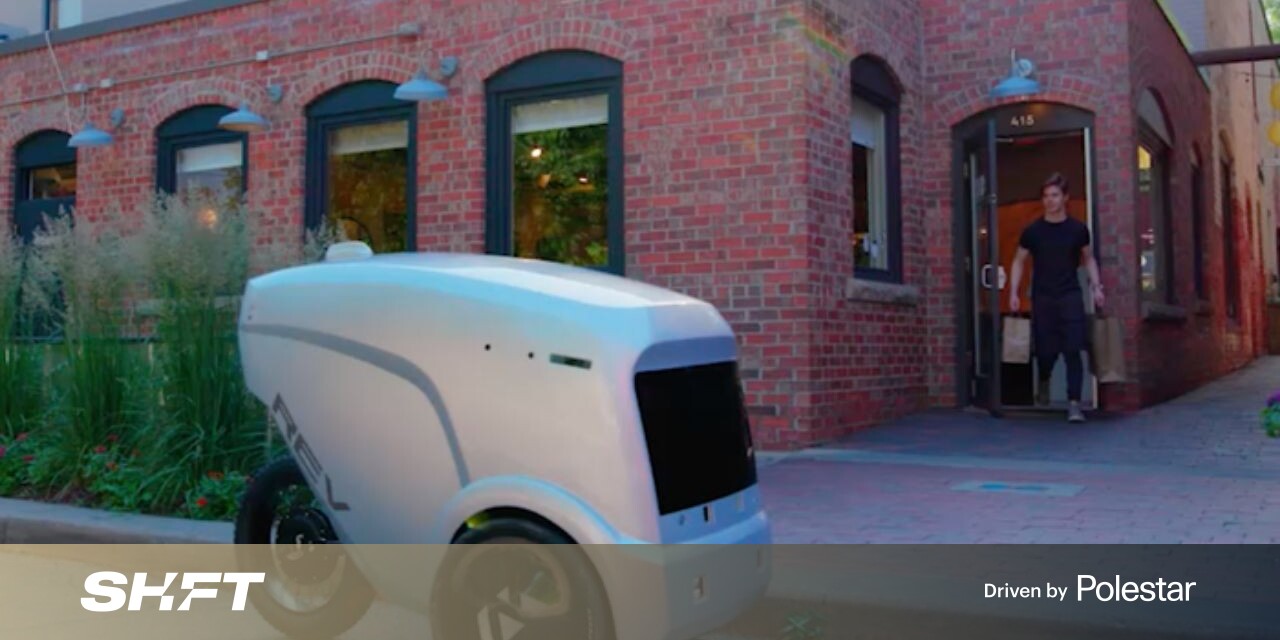These cute robots are now delivering pizza across Austin, Texas
[ad_1]
This article was originally published by Sarah Wray on Cities Today, the leading urban mobility and innovation news platform reaching an international audience of city guides. Follow Cities Today on Twitter, Facebook, LinkedIn, Instagram, and YouTube for the latest updates, or sign up for Cities Today News.
Start-up Refraction AI has started a pilot program with ten of its REV-1 delivery robots in Austin, Texas.
The service launched with Southside Flying Pizza for deliveries to the city’s South Congress, Downtown, and Travis Heights areas can be expanded as more businesses come on board.
The three-wheeled electrical devices, which travel at speeds of up to 24 km / h and are remotely controlled, are operated on cycle paths or on the road where there are no cycle paths. Assistants drive nearby to ensure safety.
The delivery vehicles are described as “about the size of a person on a bicycle”, are 1.37 m high, 1.37 m long and 76 cm wide and can hold about six shopping bags.
“Working with innovators in this field gives us an opportunity to learn more about robot delivery and how it can benefit the community as we continuously improve our transportation ecosystem,” said Gina Fiandaca, Austin Assistant City Manager for Mobility. “We believe that better access to robotic delivery on the last mile will lead to a greener future with safer and less congested roads, and we look forward to leveraging the technology as we continue to prioritize both sustainability and equity.”
No municipal funds are used in the pilot project.
security
The vehicles in Austin are operated by State legislation as well Resolutions adopted by the city council.
Jacob Culberson, Division Manager, Mobility Services, City of Austin said Cities Today: “The city’s responsibility is always safety.”
The city worked with Refraction AI prior to launch to make sure the robots obey the rules on lights, brakes, etc. and to demonstrate them to the fire department and police.
Austin also sought feedback from the city of Ann Arbor, Michigan, where Refraction AI’s robots were being used since December 2019.
“Refraction AI has been great working with us to bring that together … and we’re confident that [the devices] are safe, ”said Culberson.
One day at a time
Austin Transportation Department Announcing the robots on social media sparked a spate of inquiries from local residents, including some concerns about the use of bike lanes.
A new type of delivery service is about to hit the streets of Austin. Keep an eye out for these three-wheeled robots in the South Congress. Assistants drive close by to ensure a safe journey. They are operated on bike lanes or on the road when there is no bike lane. pic.twitter.com/5ueGd9pEBR
– ATX Transportation (@austinmobility) June 9, 2021
“If we can reduce the number of single-person vehicles by replacing them with small electric vans, which pose a much lower risk to the people around them than traditional automobiles, then I think that will be a win,” said Culberson, adding, that due to their size and speed: “I have the feeling that our bike people won’t bother us much.”
According to state law, the devices are obliged to stop all other traffic, including bicycles and pedestrians, and to give them the right of way. According to Refraction AI, the REV-1 has “the shortest braking distance of any device on the road”.
Culberson says the city will take things over “one day at a time” and could develop local regulations if necessary, as it did with e-scooters.
There is no formal data release for the pilot, but Refraction AI has agreed to share some data points with the city. Residents are also encouraged to report problems to the 311 service.
“In the past year it has become more apparent that our current solutions for on-demand delivery are not working. local businesses and households are struggling to keep up with rising fees, while profitability is hard to achieve for even the biggest players, “said Luke Schneider, CEO of Refraction AI, which launched in 2019. “Our expansion into Austin is another step in our vision of turning last mile delivery into an ubiquitous, accessible, and sustainable service that anyone can participate in.”
Starship Technologies also conducted a brief pilot test with street robots in Austin in 2017.
Do electric cars excite your electrons? Do e-bikes make your wheels spin? Do self-driving cars bring you all to charge?
Then you need the weekly SHIFT newsletter in your life. Click here to login.
[ad_2]

